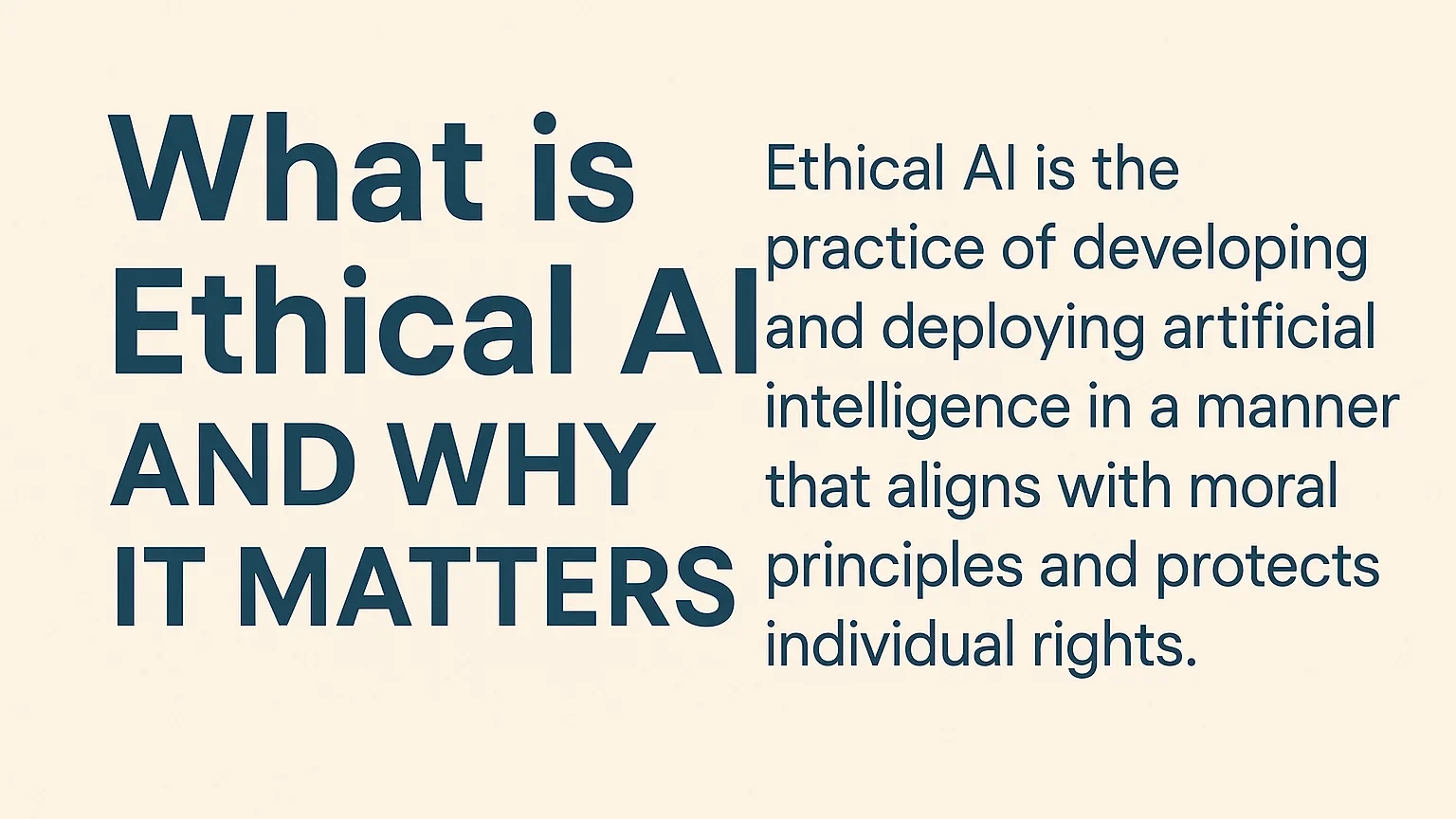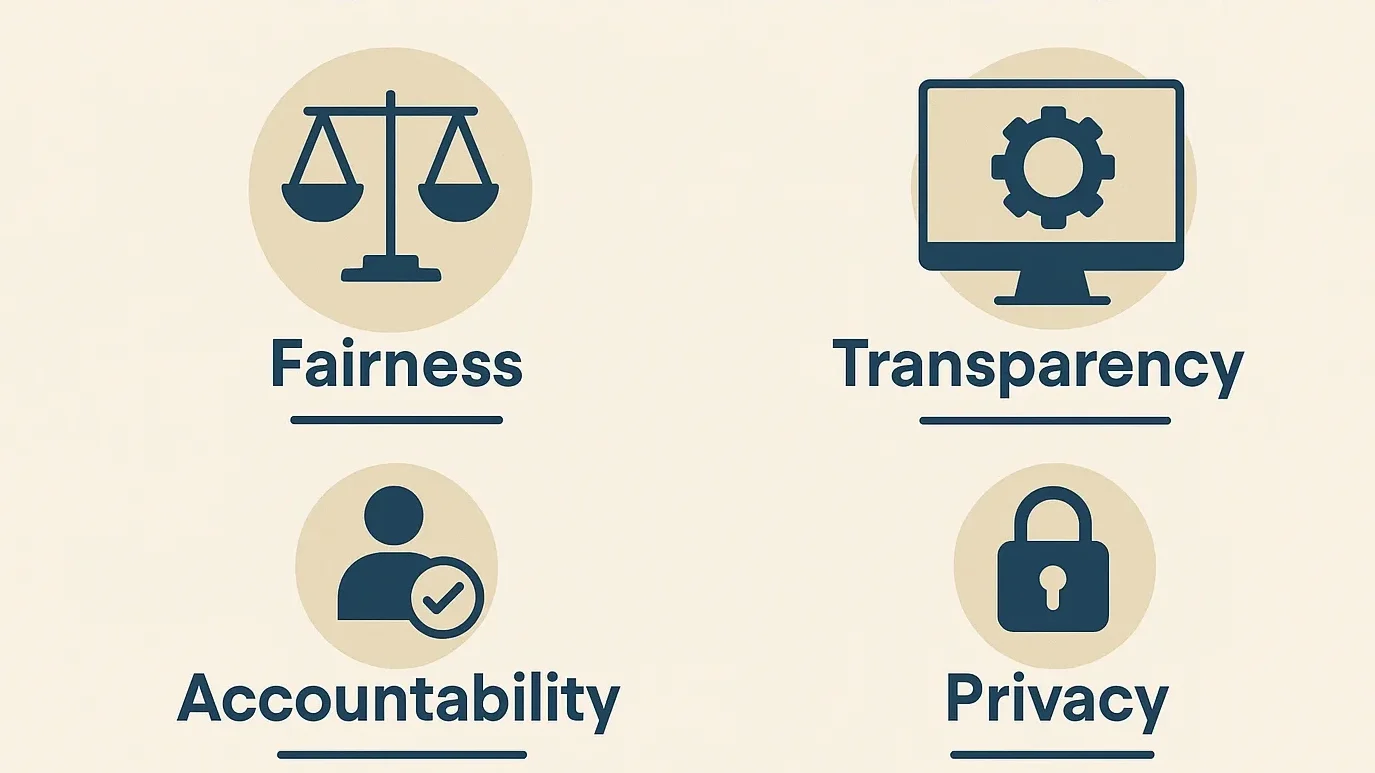Have you ever thought about how some companies stand out in tech without making the most noise? It’s not always about speed or size. These days, a lot of success in tech is coming from one quiet factor: ethics. In fact, research from MDPI in a South-Asian high-tech industry context shows that ethics in corporate governance, HR, sales, and marketing have a substantial and affirmative impact on performance, especially when combined with technological change. This demonstrates that companies taking ethics seriously can gain a real competitive advantage, even without making headlines.
Especially when it comes to Artificial Intelligence (AI), being fair, transparent, and responsible is becoming a key difference.
Table of contents
What is Ethical AI and Why It Matters
Ethical AI refers to the use of AI in a manner that respects individuals’ rights, avoids unfair treatment, and operates with clear values. It means building tech that understands humans, doesn’t cause harm, and respects privacy. It also means being honest about how AI works and making sure people can trust it.

In today’s fast-moving tech world, trust has become just as important as innovation. And when AI tools are involved in decisions such as hiring, finance, healthcare, or education, people want to know that it’s being used the right way. That’s where ethical AI brings value.
Builds Trust from the Start
When people are aware that an AI system has been built with fairness and privacy in mind, they feel more comfortable using it. If users or clients feel they’re treated properly, they tend to stay longer. That trust turns into loyalty.
For example, consider a digital platform that facilitates student learning. If the AI inside it treats all students equally, respects their data, and provides accurate feedback, students will likely enjoy using it. Parents and schools also feel better when they know the tech is honest.
Helps Teams Make Better Decisions
Ethical AI is not just good for users. It’s also suitable for teams building the technology. When developers, designers, and managers work with clear values, their decisions are more focused. They spend less time fixing issues and more time building useful features.
It also helps teams ask the right questions early on, like, “Is this fair to all users?” or “Are we using this data with proper consent?” This saves effort later and improves the quality of the product.
Even companies working in areas such as computer parts wholesale or digital systems distribution can benefit from these values. When AI systems manage inventory or track customer behavior, the ethical use of that data fosters better trust and stronger, long-term business relationships.
Reduces Risks Without Slowing Things Down
Some people think that ethics can slow down tech projects, but that’s not true. In fact, following ethical practices helps avoid problems like public complaints, user loss, or legal trouble. These risks can be time-consuming and costly to rectify.
When ethics are built into the system from the beginning, it’s easier to manage things smoothly. It means fewer surprises and a better chance that the product will work well for a broader range of people.
Makes the Team Feel Proud
One aspect that is often overlooked in tech discussions is team morale. When people are working on a product, knowing they are doing the right thing, they feel better about their work. They’re more likely to stay, share ideas, and improve the system over time.
This also helps in attracting better talent. Increasingly, professionals seek to work with teams that prioritize values over profits. If your team is known for doing meaningful work, you attract good people.
Sets You Apart in a Crowded Market
In a space where many products offer similar features, ethical AI becomes a subtle yet powerful means of differentiation. It’s not always about fancy features. People also care about how a product treats them and what values it stands for.
When your system avoids bias, respects data, and is easy to explain, it naturally builds a good reputation. Over time, this can be more powerful than just adding more features.
Even companies involved in distribution networks, such as Samsung SSD distributor operations, are beginning to see the benefits. When partners and clients know your systems handle data responsibly, it makes collaborations smoother and more dependable.
How Ethical AI Becomes a Long-Term Strength
Let’s talk about why this isn’t just a trend. Ethical AI isn’t a one-time trick. It becomes a solid base for long-term success.

Keeps Users for Longer
People tend to stay with tech they trust. If a product respects their privacy and treats everyone fairly, they don’t feel the need to switch. They might even recommend it to others. This kind of word-of-mouth is strong, and it doesn’t cost anything.
Easier to Work Across Borders
If a company wants to expand across different countries, having an ethical AI approach gives it a competitive advantage. Many countries now have strict digital rules for these digital transformations. If the system already respects these ideas, it’s easier to meet those rules. That means smoother expansion.
Builds Strong Partnerships
Tech is not built alone. Most successful projects come through partnerships. Ethical AI helps build those links because other teams feel safe working together. They know the system has clear values, and that builds trust quickly.
Simple Steps That Help Build Ethical AI
You might think this all sounds good, but how do you do it? Good question. Here are a few simple habits that teams can follow:
Start Early
Ethics should not be the last step. From the moment you think of an idea, you should ask who might be affected, what kind of data you are using, and whether there are any risks. When these questions are part of early planning, it’s easier to stay on track.
Keep Things Transparent
If your system makes decisions like sorting, recommending, or analyzing, explain how it works in simple words. You don’t need to explain every detail, but give people an idea of what’s happening and why.
Avoid Bias in Data
Bias can creep in if the data used to train your IoT Artificial Intelligence is not balanced. Perhaps it only applies to specific groups or locations, a particular concern given the often geographically distributed nature of IoT deployments. Ensure that your data accurately represents different individuals fairly. Additionally, test the system with real users to determine if it behaves differently for other individuals.
Make Consent Easy
If you collect any user data, always ask clearly. Please keep it simple; no long forms, please, and use capital letters. People should know what you are collecting and why. They should also have a clear way to say “no” or change their mind later.
Keep Learning
Technology keeps moving. So does the idea of ethics. Keep updating your knowledge. Listen to what users are saying. Talk to other teams. Be open to change if you find a better way to do things.
Final Thoughts
Ethical AI is no longer just a desirable feature; it is a necessity. It’s becoming the reason people choose one product over another. It fosters trust, helps teams stay focused, and lays the groundwork for long-term success. It’s not only about doing the right thing. It’s also a smart move.
And the best part it doesn’t require big changes or fancy tools. It begins with simple habits: asking questions, being honest, thinking about others, and keeping things clear. In a rapidly evolving tech landscape, these incremental steps yield a significant advantage that endures over time.











